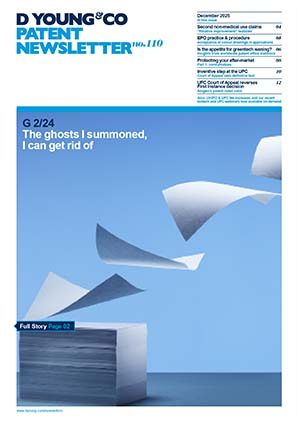UK High Court overrules UKIPO to find AI inventions patentable
In what may turn out to be a watershed judgement, the High Court in Emotional Perception AI Ltd v Comptroller-General of Patents, Designs and Trade Marks [2023] EWHC 2948 (Ch) found that the UK Intellectual Property Office (UKIPO) had erred in finding a neural network implementing a recommendation system as being excluded from patentability.
The patent application in question claimed a system for providing enhanced media recommendations to users. The system relied on a novel artificial neural network (ANN) characterised by its distinctive training method. Essentially, the ANN was trained using pairs of media files, each accompanied by semantic descriptions of their content. Two different “separation distances” were derived for each pair of media files, one based on natural language processing of semantic descriptions of the media files, and a second based on measurable properties extracted from the media files themselves. During training the ANN was trained to converge the distances between these two different measures of separation distance to create a mapping between the two. Based on this training the ANN was able to recommend a media file that was semantically similar to an input media file based on its measurable properties.
During examination at the UKIPO the patent examiner maintained throughout that the claimed invention constituted subject-matter excluded from patentability. Finally, in a UKIPO hearing officer decision (BL/O/542/22), dated 22 June 2022, the hearing officer, while acknowledging that the invention was a significant improvement over the prior art, ultimately refused the application as constituting a “program for a computer” as such, and hence being excluded from patentability. This High Court decision represents an appeal to this hearing officer decision.
In his judgment, Sir Anthony Mann disagreed with the UKIPO in multiple key aspects. First, the judge accepted the patentee’s submissions that ANN is not a program for a computer and should, in effect, be treated as a piece of hardware, irrespective of whether it was directly implemented as hardware or as an “emulated ANN”. Accordingly, the judge considered that the subject-matter exclusion was not invoked at all.
Second, the judge found that, in any case, the claimed system demonstrated a technical effect substantial enough to avoid the subject-matter exclusion. The judge considered that the system’s identification of the media file for recommendation was based on “technical criteria which the system has worked out for itself” and that the output of these media files thereby constituted a technical effect outside the computer for the purposes of escaping the subject-matter exclusion. Interestingly, the claims defined that a media file could be a “text file”, the manipulation of which the UKIPO has historically been very resistant to granting patents on.
On the face of it, this decision is extremely positive news for those seeking to patent AI inventions in the UK and should hopefully make achieving grant substantially easier. We eagerly await to see how the UKIPO responds to this judgment, and in particular what, if any, updates the UKIPO makes to its examiner guidance. In the meantime, if you have any questions on this subject, or would like any assistance with protecting a computer-implemented invention, please contact your usual D Young and Co representative.
Case details at a glance
Jurisdiction: England & Wales
Decision level: High Court (Chancery Division)
Parties: Emotional Perception AI Ltd vs Comptroller-General of Patents, Designs and Trade Marks
Citation: [2023] EWHC 2948 (Ch)
Date: 21 November 2023

